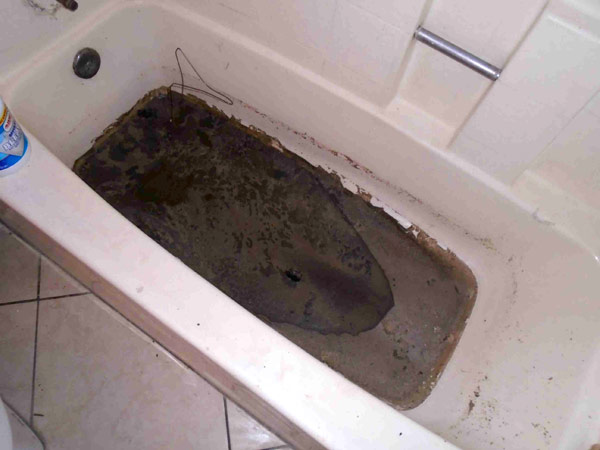Your Definitive Explanation: Discharge Coming Up Through the Bathtub
Your Definitive Explanation: Discharge Coming Up Through the Bathtub
Blog Article
What're your opinions about What to Do if Sewage Starts Coming Up Through Your Bathtub?

Sewer back-up in the bath tub can be an upsetting and unhygienic issue for any type of house owner. Not just is it inconvenient, however it additionally presents serious health risks and suggests underlying concerns with the plumbing system. Understanding why sewer is turning up through the bathtub is important for taking proper activity to address the issue efficiently.
Introduction to the Issue
Common Factors for Sewer Back-up
Obstructions in the Sewer Line
Among the most typical root causes of sewer backup is an obstruction in the sewer line. This can occur due to the buildup of debris, grease, or international things in the pipes, stopping proper circulation and causing sewage to back up into your bath tub.
Tree Origin Invasion
Tree origins looking for dampness and nutrients can penetrate sewage system lines via little fractures or joints. In time, these origins can expand and increase, creating substantial damages to the pipelines and resulting in sewer backup issues.
Recognizing the Trouble
When sewer starts backing up into the bath tub, it's a clear indication of a trouble with the water drainage system. The wastewater that should be flowing far from your home is rather finding its way back into your space, which can lead to substantial damages and carcinogen.
Possible Causes
Several aspects can add to sewer backup in the bathtub. From clogs in the sewer line to concerns with the plumbing facilities, recognizing the origin is crucial for locating a service.
Aging Facilities
Older homes may have obsoleted plumbing systems that are a lot more prone to corrosion, splits, and deterioration. As pipes age, they become more prone to leaks and obstructions, enhancing the chance of sewage back-up occurrences.
Heavy Rainfall or Flooding
During durations of heavy rainfall or flooding, the drain system may end up being overloaded with excess water, causing backups and overflows. This can cause sewage supporting into tubs and other components inside the home.
Indicators of Sewage Back-up
Foul Odors
Unpleasant smells emanating from drains pipes or components, particularly in the restroom, might indicate sewage back-up problems. These smells are typically solid and consistent, signifying a trouble that calls for immediate interest.
Slow Draining Fixtures
Bathtubs, sinks, and toilets that drain slowly or not in any way could be experiencing sewage back-up. If several fixtures are influenced simultaneously, it's likely that the concern stems from an usual point, such as the main sewer line.
Gurgling Sounds
Unusual gurgling or bubbling sounds coming from drains when water is running somewhere else in the house are a measure of air entraped in the plumbing system. This air buildup can arise from sewer back-up and should be investigated quickly.
Wellness Risks Related To Sewage Backup
Contamination of Water
Sewage back-up can pollute the water supply in your house, positioning a major health and wellness risk to you and your household. Direct exposure to contaminated water can result in stomach concerns, skin infections, and other ailments.
Mold Growth
Wetness from sewer backup can develop excellent conditions for mold and mildew growth in your home. Mold spores can intensify breathing troubles and create allergies in delicate people, making timely cleaning crucial.
Spread of Disease
Sewer consists of damaging germs, viruses, and bloodsuckers that can cause a series of conditions, including liver disease, cholera, and gastroenteritis. Entering into contact with sewage or polluted surface areas puts you in danger of infection.
Cleaning Up After Sewage Back-up
Sanitation Procedures
Completely sanitize and disinfect influenced locations after sewer backup to eliminate damaging germs and protect against mold growth. Use appropriate cleaning items and safety gear to ensure safe and efficient cleanup.
Repair of Affected Locations
Repair any type of damage to flooring, wall surfaces, or components brought on by sewage backup. Depending on the extent of the damage, you may require to replace carpets, drywall, or various other products to restore your home to its pre-loss problem.
Immediate Actions to Take
Switching Off Water System
In case of sewer backup, it's vital to shut off the water system to prevent further contamination and damage. Locate the primary water shutoff valve in your house and shut it off until the issue can be resolved.
Contacting an Expert Plumber
Handling sewer back-up is not a DIY task. Contact an accredited plumber with experience in taking care of sewage-related concerns to assess the circumstance and perform essential fixings or cleanings.
Avoiding Contact with Contaminated Water
Until the sewage backup is resolved, avoid contact with contaminated water to avoid the spread of bacteria and virus. Use safety gear if you should be in the afflicted location and clean your hands thoroughly later.
Safety nets
Regular Upkeep of Sewage System Lines
Set up normal inspections and maintenance of your sewage system lines to recognize and address potential issues before they escalate into significant troubles. This can consist of cleaning debris, evaluating for tree origin intrusion, and repairing any kind of damaged pipelines.
Mounting Backwater Valves
Consider installing backwater shutoffs in your plumbing system to stop sewage from receding right into your home during periods of heavy rainfall or flooding. These valves instantly close when water draws back up, securing your property from contamination.
Proper Disposal of House Waste
Stay clear of purging anything other than toilet tissue and human waste down the toilet to stop obstructions and clogs in the sewage system line. Dispose of oil, oil, and other house chemicals appropriately to minimize the danger of plumbing problems.
Why is There Sewage Coming Up Through the Bathtub
Sewage in your bathtub is a major problem that can make you want to abandon the bathroom for good. You don’t have to. However, it is important to identify the source of the issue and take the necessary steps to resolve it in order to avoid any health risks and property damage. In this article, we will discuss what could be causing sewage to back up through your bathtub so you can take action quickly and effectively.
The Main Reason For Sewage Backup in The Bathtub
All the sinks and toilets in your home connect to different pipes that lead to the main sewer line. The sewer line then connects to the municipal sewer system. This connection works seamlessly on a daily basis, but there can sometimes be a problem with the main sewer line.
The most common cause of sewage backup is a clogged or blocked main sewer line. The main sewer line can be clogged due to the accumulation of debris, tree roots or grease buildup, or other materials. Another possible cause is a collapsed pipe. When this happens, your toilets and sinks won’t be able to drain properly. This is when sewage starts backing up through the bathtub. If the problem has been occurring for some time now, it might be time to consult with a plumber as there may be more severe damage that needs fixing.
How Can You Tell if it’s Coming From Your Sewer Line?
If you’re experiencing a sewage backup in your bathtub, then you can use a few simple methods to determine if it is coming from the main sewer line. First, try to unclog the tub drain with a plunger or an auger and see if that helps. If not, then inspect all of the drains in your house and check if there is any blockage in them. If some of the other drains are not working fine, then it’s likely the problem is with your main sewer line.
Common Signs of a Clogged Main Sewer Line
If you suspect that your main sewer line is blocked, then there are a few common signs to look out for. Frequent clogs in your home are a sure sign of a clogged sewer line. You can also check for slow drainage from all the plumbing fixtures.
Slow Drains
If you notice that it takes longer for your sinks and toilets to drain, then this could be a sign of a clogged main sewer line.
Frequent Clogs
Another common sign is that your drains or toilets become clogged almost all of the time. If this happens, then it could be a sign that the main sewer line is blocked.
Water Backup
Do you notice water or sewage coming back up from any of the drains in your home? If your answer is yes, you may have a clogged main sewer line.
Sinkholes
If you’ve noticed sinkholes in your yard or overflowing sewage from the ground, you may be facing a blocked sewer line issue.
Your Shower or Sink Makes Gurgling Noises
Have you noticed gurgling noises coming from your sink or shower lately? These are typically signs of a blocked sewer line and should be checked out immediately.
How to Prevent a Main Sewer Line Clog
Once you’ve identified that your main sewer line is clogged, it’s important to take steps to prevent it from happening again. The best way to do this is to avoid putting any solid material that can clog the drain, such as grease and other debris. You should also be mindful of what you flush down your toilet. In addition, you should schedule regular maintenance for your main sewer line. This will help keep it clear and free from clogs or backups.
What Should You do if You Notice Sewage Backing up Through The Bathtub?
If you’ve noticed sewage backing up through the bathtub, then it is important to call a professional plumber immediately. A plumber can inspect the situation and determine what the cause is, such as a blocked main sewer line. They will also be able to advise you on how best to fix the issue. In some cases, a simple drain cleaning may be all that is needed.
However, if the blockage is severe, then your plumber may need to use more advanced methods to clear the blockage.
No matter what, it is important to always call a professional plumber if you experience any kind of sewage backup. They will be able to assess the situation and provide you with a solution that is best for your home.
https://baylorinc.com/blog/why-is-there-sewage-coming-up-through-the-bathtub/

Do you really like reading about Why is There Sewage Coming Up Through the Bathtub? Make a review below. We will be glad to know your insights about this content. We are looking forward that you visit us again in the near future. Sharing is caring. You just don't know, you may just be helping someone out. I recognize the value of your readership.
Contact
Report this page